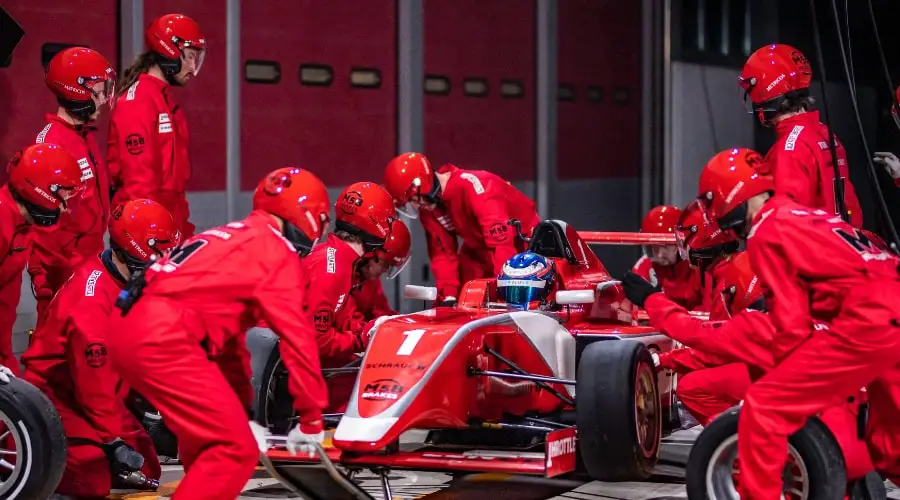Racing helmets are designed to protect the head from impacts during high-speed motorsports. They are meticulously engineered to absorb and distribute the force of a crash, safeguarding the wearer from severe head injuries. However, an intriguing question arises: can a racing helmet stop a bullet? In this article, we delve into the world of ballistic resistance and examine whether racing helmets possess the capability to withstand the force of a bullet. Let’s explore the truth behind this captivating inquiry.

Racing Helmet Technology and Purpose
Before delving into the intriguing question, let’s understand the technology and purpose behind racing helmets. These helmets are engineered to provide maximum protection to drivers during high-speed races. Constructed from advanced materials such as carbon fiber, Kevlar, and fiberglass, racing helmets are designed to offer impact absorption and distribute the force across the entire shell. They incorporate cushioning liners and energy-absorbing foams to enhance their protective capabilities.
How Racing Helmets Protect Against Impact
Racing helmets excel at safeguarding against head injuries caused by crashes and collisions. They employ a combination of features to mitigate the impact forces. Here’s how they provide protection:
- Outer Shell: The rigid outer shell of a racing helmet is constructed from high-strength materials such as carbon fiber, which distribute the impact across a larger area, reducing the force experienced by the head.
- Inner Liner: Beneath the outer shell, racing helmets have an inner liner made of expanded polystyrene (EPS) foam. This liner is designed to compress upon impact, absorbing and dissipating the energy before it reaches the wearer’s head.
- Chin Strap and Retention System: The chin strap and retention system ensures that the helmet stays securely on the wearer’s head during a crash, preventing it from coming loose and potentially causing additional injuries.
Can a Racing Helmet Stop a Bullet?
Now, let’s address the burning question: Can a racing helmet stop a bullet? The short and straightforward answer is no. Racing helmets are not designed or certified to provide ballistic protection against bullets. While they excel at mitigating impact forces, their construction and materials are not designed to withstand the extreme velocities and penetrative power of bullets.
To understand why racing helmets are not suitable for bullet resistance, it’s important to differentiate between the forces involved in a crash and those exerted by a bullet.
Crash Forces vs. Bullet Forces
When a crash occurs during motorsports, the forces involved are primarily impact forces resulting from the deceleration of a moving vehicle. Racing helmets are specifically engineered to absorb and distribute these impact forces, thereby reducing the risk of severe head injuries.
On the other hand, bullets travel at incredibly high velocities and exert a different type of force on impact. They possess significant kinetic energy, which allows them to penetrate various materials, including metals and bulletproof vests specifically designed for this purpose. The combination of velocity and mass makes bullets formidable projectiles that exceed the protective capabilities of racing helmets.

Bulletproof Helmets: A Specialized Solution
While racing helmets may not stop bullets, there are specialized helmets available that are designed to provide ballistic protection. These helmets, commonly referred to as bulletproof helmets or ballistic helmets, are engineered using materials and technologies specifically tailored to resist penetration by bullets. They incorporate additional layers of ballistic fibers, aramid composites, and ceramics to provide enhanced protection.
Bulletproof helmets undergo rigorous testing and certification processes to ensure they meet specific ballistic standards, such as the National Institute of Justice (NIJ) standard in the United States. These standards assess the helmet’s ability to withstand the impact and penetration of different types of ammunition. It’s important to note that bulletproof helmets are typically bulkier and heavier than racing helmets due to the additional ballistic layers and materials required for effective bullet resistance.
Related: Are Open-Face Helmets Allowed in Racing?
FAQs
FAQ 1: Can a racing helmet provide any protection against bullets?
No, racing helmets are not designed to provide any level of protection against bullets. Their primary function is to absorb and distribute impact forces during crashes and collisions in motorsports.
FAQ 2: Why can’t racing helmets stop bullets?
Racing helmets are constructed to withstand impact forces encountered in motorsports, not the high-velocity penetrative forces of bullets. The materials, design, and certification standards differ significantly between racing helmets and bulletproof helmets.
FAQ 3: Are there any helmets that can stop bullets?
Yes, there are specialized helmets known as bulletproof helmets or ballistic helmets that are designed to offer varying levels of protection against bullets. These helmets are engineered specifically for military, law enforcement, and tactical purposes.
FAQ 4: How are bulletproof helmets different from racing helmets?
Bulletproof helmets are constructed with ballistic materials such as Kevlar, aramid composites, and ceramics, which provide resistance against bullet penetration. They undergo rigorous testing and certification to meet specific ballistic standards. Racing helmets, on the other hand, prioritize impact absorption and distribution using materials like carbon fiber and foam.
FAQ 5: Can a racing helmet reduce the severity of a bullet-related injury?
While a racing helmet is not designed to stop bullets, it may potentially reduce the severity of a bullet-related injury. However, it’s crucial to emphasize that wearing a racing helmet alone does not guarantee protection from bullet penetration or the potentially lethal consequences of bullet impact.
FAQ 6: Is it advisable to wear a racing helmet in situations involving firearms?
No, wearing a racing helmet as a substitute for proper bulletproof headgear is highly discouraged. When dealing with firearms or situations where ballistic protection is necessary, it’s crucial to rely on equipment specifically designed and certified for that purpose, such as bulletproof helmets.
Conclusion
The question “Can a racing helmet stop a bullet?” can be answered with a definitive “no.” Racing helmets are engineered to provide protection against impact forces during motorsports, not against the high-velocity and penetrative forces of bullets. While they excel at reducing the risk of head injuries in crashes, their construction, materials, and certification standards are fundamentally different from those of bulletproof helmets.
When it comes to situations involving firearms or the need for ballistic protection, it is essential to utilize equipment specifically designed for that purpose, such as bulletproof helmets. These helmets undergo rigorous testing and certification processes to ensure their effectiveness against bullets.
It’s crucial to prioritize safety and equip oneself with the appropriate protective gear for each specific situation. The world of motorsports and firearms necessitates distinct safety measures, and understanding the limitations and capabilities of different equipment is vital.
Helmetslab is a website that focuses on providing in-depth reviews and information about different types of helmets, including motorcycle helmets and others helmets. I am writing a post with proper research on the info that helps helmet users.

